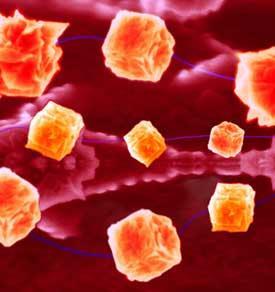Professor Vadgama qualified in medicine before moving into biochemistry and biomedical materials using sensors to monitor the performance of athletes
Biosensors are a way of monitoring patients, especially patients who might be critically ill or diabetic, because sensors provide continuous data, real-time information about biochemical changes inside the body. Chemistry is required to throughout the process. The interesting part is how do you miniaturise so that you can implant these devices in human beings and how do you implant and at the same time allow the body to tolerate this alien implant of your sensor?

How did you get into your job?
My career path is somewhat unusual, my first degree was in medicine at the university of Newcastle, and after qualifying I decided to go into laboratory medicine, histopathology. I decided it wasn’t quite for me so I moved into a sister discipline of pathology, called clinical biochemistry. My boss at that time believed his junior doctors knew very little science so he sent us to do a chemistry degree. That triggered a very unusual career pathway because I was never quite a doctor and never quite a chemist.
I was essentially headhunted by ICI, in those days, Imperial Chemical Industries, who were looking for a biotechnology approach to their products. So my career switched from being a developing NHS pathologist to being a researcher, and since then I’ve simply expanded on my research activities in biochemical sensors.
What do you do in your job?
My laboratory does about five and a half million tests per annum, but this is on single samples of blood, where you get a slice of time which you can investigate. What sensors do is provide a continuous readout. So you have a continuous trace of the ups and downs of what the biochemistry’s doing inside the body.
We were awarded, with our lead partners Imperial College, a project to monitor elite athletes. An elite athlete is physiologically at the extreme of human endurance. We hope to provide better insights, to training regimes and the well-being and performance of athletes. See Biosensors calculate the road to sporting victory
What advice would you give for people wishing to enter your career area?
Whatever your final career is, chemistry opens up many doors beyond chemistry. Think about whether you are switched on by research and enquiry, or are you actually switched on more about delivering practical things for society.
Chemistry used to be much more of a standalone discipline, but now it’s interacting with physics, material science, and in my case, biomedicine. The mindset of chemists can help unravel the complexities of our natural world and with chemists entering applied worlds they are beginning to make huge inroads into the areas of global warming, energy limitation and clean living. Chemistry is a way of thinking, and that way of thinking translates across all sorts of disciplines.
First published 2011
Additional information













